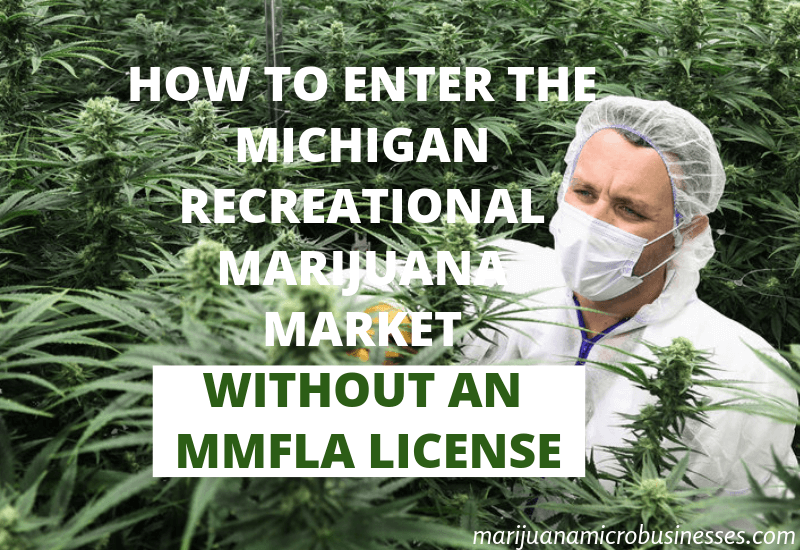Michigan’s voters passed Proposal 1, which is now referred to as the Michigan Regulation and Taxation of Marihuana Act (MRTMA), on November 6, 2018, making the recreational use of marijuana legal for adults who are 21 and older. This law, which became effective as of December 6, 2018, made Michigan the first state in the Midwest to authorize a market for recreational marijuana use. It also authorized a new type of marijuana business license here in Michigan—the microbusiness license.
Prior Michigan Medical Marijuana Laws
In 2008, Michigan voters approved the Michigan Medical Marijuana Act (MMMA), and since then the law has evolved through case law. With the progression of this law, we can predict a few ways the MMMA will dictate the future of recreational marijuana. One golden rule applicable to both medical and recreational marijuana users is that you cannot drive under the influence of marijuana. Another key rule is that marijuana is prohibited in schools and places where children are prevalent. It’s simple; we want to protect our streets and our children to provide a safe environment above all else. We don’t want our children exposed to drugs, no matter how good or bad, at an early age, and we want to encourage road safety with coherent and alert drivers.
As learned through case law from alleged violations of the MMMA, caregivers are not allowed to grow marijuana plants for one another, even if you all have a license to do so. For example, you can grow up to 12 plants, but you cannot grow or store plants for another caregiver who also has a marijuana license—you can only grow for yourself and your registered patients. Additionally, medical marijuana patients cannot sell their medical marijuana to others. Similarly, citizens who use marijuana recreationally cannot sell marijuana to each other, but Prop 1 does allow for them to give it to a friend as a gift.
People in the medical marijuana market ran into the most problem with handling, using, possessing, and transporting more marijuana than the law allowed. This excess marijuana—frequently referred to as “overages”—have been the lifeblood of most professional caregivers, who were selling their excess medical marijuana to Michigan dispensaries. While technically a violation of the MMMA, such sales were common and mostly overlooked by state enforcement officers. Nonetheless, with new changes in the law brought about by the MMFLA, caregivers are no longer able to sell directly to dispensaries.
The Medical Marihuana Facilities Licensing Act, or simply MMFLA, was the law that brought the Michigan medical marijuana industry into the realm of traditional businesses. The MMFLA required that Marijuana growers, processors, provisioning centers (i.e. dispensaries), transporters and testers obtain state and municipal licensing. This law, however, did not replace the MMMA, though we do believe that the MMFLA will lead to stricter enforcement of often overlooked violations of the MMMA. Why do we think this? Well, the MMFLA provides for an excise tax, as does the MRTMA. The MMMA does not, so it is in the state’s best interest to funnel everything into the MMFLA and MRTMA regimes so that the state can collect taxes on the sale of Michigan marijuana.
Where to Start?
Before leaping head first into the recreational marijuana market, it is important to note that the MRTMA restricts the availability of all of its six license types—except for the Class A and microbusiness licenses—to persons who already have the equivalent license under the MMFLA. This means that you cannot just open a recreational dispensary. You first need to obtain a medical marijuana provisioning center license first, and only once that is obtained, can you then apply for a recreational marijuana retailer license.
What if I Want to Enter the Recreational Market but Don’t Already Have an MMFLA license?
You have three options. The first one is obvious—you can apply for one first. The second option is to apply for a Class A 100 plant grow, but these licenses are pretty worthless in our opinion. The third option is to apply for a microbusiness license.
If you are a caregiver, we strongly suggest that you consider the Marijuana microbusiness license, which is discussed in more detail below. This license was literally designed as an avenue for caregivers to stay in the industry. With caregivers receiving potential unfair treatment by the Medical Marijuana Licensing Board, obtaining a medical marijuana license may be difficult, especially if you’ve made money off your caregiving activities.
What’s a Michigan Microbusiness License?
A microbusiness license allows the licensee to grow, process and sell marijuana all from a single license. There are limitations for this license type, however, including:
- You can only sell direct to the consumer
- You can only grow 150 plants
- You have to grow and process under one roof (but not necessarily sell from that location, as commonly believed)
- If you own an interest in a microbusiness, you can’t have an interest in any other marijuana establishment
While these restrictions do limit what you can do, and it is possible LARA will restrict this license type even further when it enacts rules under the MRTMA (which could be coming soon), there are a lot of possibilities with respect to this license.
What Do I Need to Do First?
After you decide on the type of license you are seeking, you will need to obtain municipal approval and then file a license application. At the time of this article, there are no municipalities that allow microbusinesses, but we expect this to change quickly once the MRTMA rules are issued by the state. With the tax revenue given to each city determined in part by the number of microbusiness licenses in their borders, municipalities are strongly incentivized to “opt-in” to microbusinesses. Here, you don’t necessarily need to be reactive—you can proactively contact your municipality to get the ball rolling.
We have had success reaching out to municipalities regarding them opting in to medical marijuana laws. When discussing this with city officials, it is important to tailor your argument to the concerns of the individual official and municipality. While each municipality will have its own needs and concerns, one concern is universal—money! All municipalities could use more revenue, even the relatively rich ones. By framing your pitch in terms of bringing needed money to the city or township, you are most likely to catch the attention of local decisionmakers.
To get approved, your application must be in compliance with the law and include an application fee. You will also need to choose an appropriate establishment and location for your business (more on that later). Applications can either be completed online or by submitting a paper application via U.S. mail or in person to LARA. At the time of this article, applications for the recreational marijuana program have not yet been released.
Note: As cannabis business attorneys who have submitted dozens of medical marijuana applications to LARA, we strongly suggest that you submit your application online. LARA officials are much less likely to misplace items in your application when submitted electronically.
So, what’s the law?
To keep your business in compliance with the law, we have compiled a list of frequently asked questions and issues:
- Your marijuana can only be visible to nosey people. This means that your marijuana use should only be visible to people using binoculars or other optical aids. Otherwise, keep your business dealings private and away from the public eye. To put things more clearly, if someone walking on the sidewalk can see the local pastor inside of your business buying marijuana cookies, then you’ve got a big problem – and so does the pastor!
- Your business’ physical address must be approved by LARA and located within an enclosed area that can easily prevent unwanted guests, such as minors. All this is saying is that your business should be in a room with secured doors so you can protect your customers, your self, your products, and get rid of the young folks who are ready to kill your high.
- The establishment’s entrances must be properly secured, and the marijuana must be held in a safe place where only employees and state officials (i.e. LARA or law enforcement) can gain access. The establishment must also provide proper precautions to secure the marijuana and protect it from theft once the business is closed for the day. Secure the bag! Implement a strict security procedure and, if economically feasible, hire adequate security to protect your business and your product.
- If the police or LARA wants to inspect the licensed premises or conduct an audit, you have to let them. It’s so good to be king.
- The business cannot be in an area designated for residential-use only. Sorry, you can’t operate your business out of your mom’s garage.
- All employees and volunteers must be at least 21 years old.
- You cannot sell illegal marijuana, which is marijuana that is not in compliance with Michigan law. Just follow the law, folks!
- You cannot transport more than 15 ounces of marijuana or more than 60 grams of marijuana concentrate at one time. Marijuana concentrate is the potent resin that is extracted from the plant. In this case, less is more! Transport less and you can save more money in fines!
- If you are a marijuana secure transporter, you cannot also own a marijuana establishment. You can’t both transport your weed and sell it, too. The government doesn’t want you to monopolize the entire market! Save some of the jobs for the other guys.
- You can’t sell marijuana-infused candy that will attract children and you cannot sell marijuana-infused candy that can easily confused with commercially sold candy. Think about it. What if you infused Skittles with marijuana and little Charlie found the Skittles in his mommy’s purse? Little Charlie will be in for one big rainbow surprise.
- Marijuana products must be sold in childproof packaging, unless the product is consumed on the premises. This is common sense. We don’t want our children inadvertently getting high off of our supply. So, don’t make it easy for them to gain access while we’re not looking.
- You cannot sell or transfer tobacco. Sorry, weed only!
Application Fee
Recreational marijuana application fees have not been determined yet. However, they will be limited to the costs necessary to administer the program. A municipality can charge you up to $5,000 in annual fees to pay for your application, administrative fees, and the enforcement costs associated with the operating your business in that municipality.
How Long is Your License Good For?
Licenses are effective for one year, unless LARA extends that time. To renew your license, so long as your business is in good standing, you must submit a renewal application and fee of no more than $5,000.
What Types of Microbusinesses will be Successful?
Our favorite business model here at Marijuana Microbusinesses is to pair the microbusiness license with a municipal social use license, which would allow you open up an Amsterdam-style coffee shop where you can sell marijuana as well as provide your customers with a place to consume it. While we won’t know for sure whether there will be additional restrictions that prevent this business model from being implemented, this model holds a lot of promise here in Michigan, especially in bigger cities or cities with lots of tourists.
However, there are lots of potential business models that could flourish under the microbusiness licensing regime. You could simply sell to a core group of customers, especially if you’ve already established a network of such customers as a caregiver, or you can join the microbusiness license with another existing business, such as an arcade, spa, movie theater or restaurant.
In upcoming articles, we will be discussing other business models we believe are well-suited for the marijuana microbusiness license. Stay tuned!
Our Marijuana Business Attorneys are ready to assist your Michigan microbusiness project. Our attorneys have practiced business, municipal and real estate law their entire careers. Unlike other “cannabis attorneys”, representing local businesses and start-ups is are specialty. If you would like to talk to an experienced Cannabis business attorney about starting up a microbusiness here in Michigan, contact us today!






